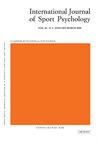Modelling competence motives and physical exercise intentions: The role of individual, social and environmental characteristics
IF 0.6
4区 心理学
Q4 HOSPITALITY, LEISURE, SPORT & TOURISM
引用次数: 4
Abstract
The purpose of this study was to investigate the relationships between individual differences(self-efficacy and body image), social factors (family support) and environmental characteristics (local authorities support), and competence motives and subsequent physical exercise intentions. Participants were 1084 students (551 males, 553 females) aged between 13 and 19 (M = 15.7, SD = 1.6) from three different Secondary Schools. Structural Equation Modelling analyses confirmed the hypothesized model: family support, local authorities support, self-efficacy and body image significantly predicted competence motives, which were in turn positively associated with physical activity intentions. Furthermore, mediation analyses revealed that competence motives fully mediated the relationship between local authorities support and self-efficacy, on one hand, and exercise intentions, on the other, and partially mediated the link between family support and intentions. These findings suggest the importance of assessing the unique contributions of psychosocial variables in affecting the motivational determinants of physical activity intentions.能力动机和体育锻炼意图的建模:个人、社会和环境特征的作用
本研究的目的是探讨个体差异(自我效能感和身体形象)、社会因素(家庭支持)和环境特征(地方当局支持)与能力动机和随后的体育锻炼意图之间的关系。参与者是来自三所不同中学的1084名学生(551名男生,553名女生),年龄在13至19岁之间(M = 15.7, SD = 1.6)。结构方程模型分析证实了假设模型:家庭支持、地方政府支持、自我效能感和身体形象显著预测能力动机,能力动机与体育活动意图正相关。此外,能力动机在地方政府支持与自我效能、运动意愿之间具有完全中介作用,在家庭支持与运动意愿之间具有部分中介作用。这些发现表明,评估影响体育活动意图动机决定因素的社会心理变量的独特贡献非常重要。
本文章由计算机程序翻译,如有差异,请以英文原文为准。
求助全文
约1分钟内获得全文
求助全文
来源期刊
自引率
12.50%
发文量
0
审稿时长
>12 weeks
期刊介绍:
The International Journal of Sport Psychology publishes empirical and theoretical contributions in the human movement sciences from all over the world. Manuscripts related to psychology, sport pedagogy, exercise and sport performance are suited to the Journal''s scope.
IJSP''s aims are to disseminate results of rigorous and relevant studies, to expose positions and commentaries regarding the development of theory and confirmation or contradiction of previous findings. IJSP entertains various methodologies encompassing coherence among epistemology, research questions, tools, statistical or clinical analyses and discussion or potential applications. Qualitative and quantitative analyses as well as case studies are of interest when appropriately used. IJSP is comprised of the following sections related to human movement sciences:
-Motor learning and control
-Cognition
-Health and exercise
-Social psychology
-Intervention / Clinical / counseling psychology

 求助内容:
求助内容: 应助结果提醒方式:
应助结果提醒方式:


